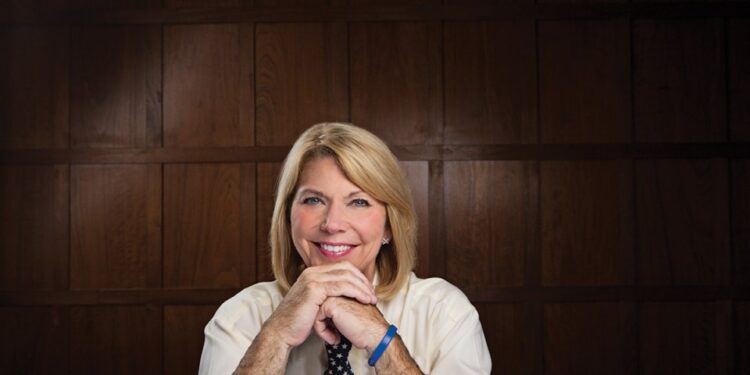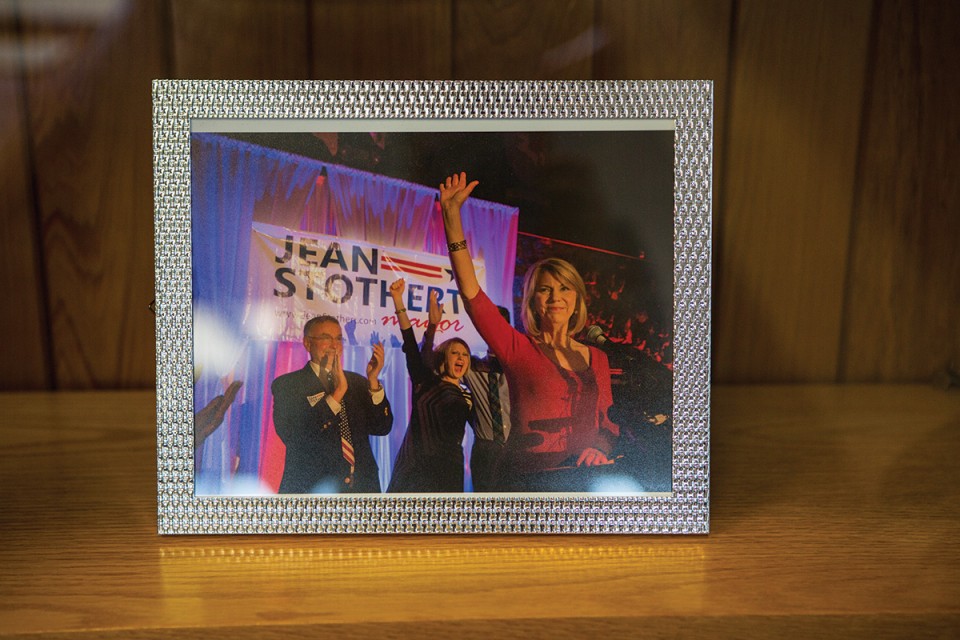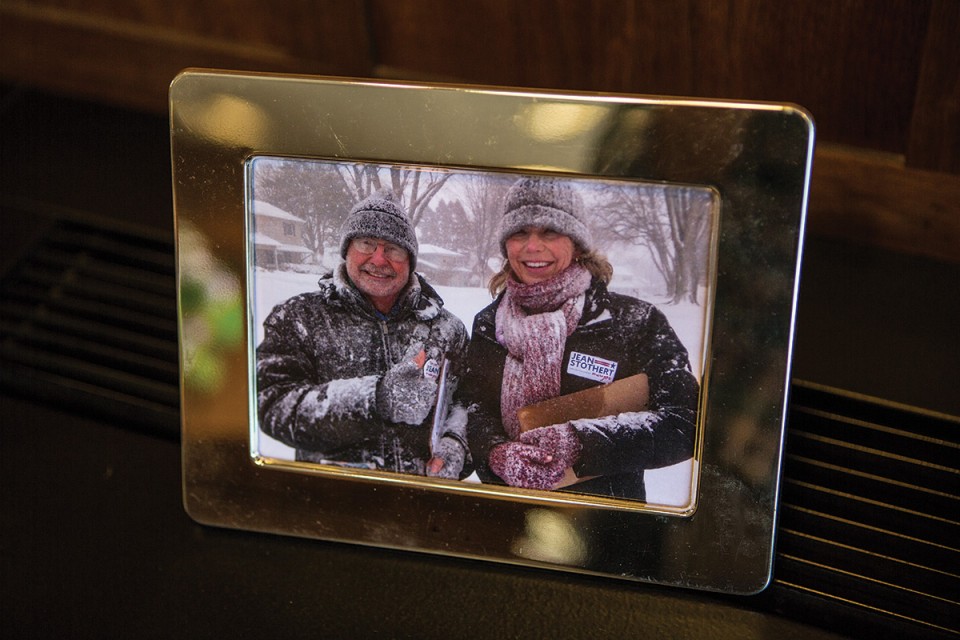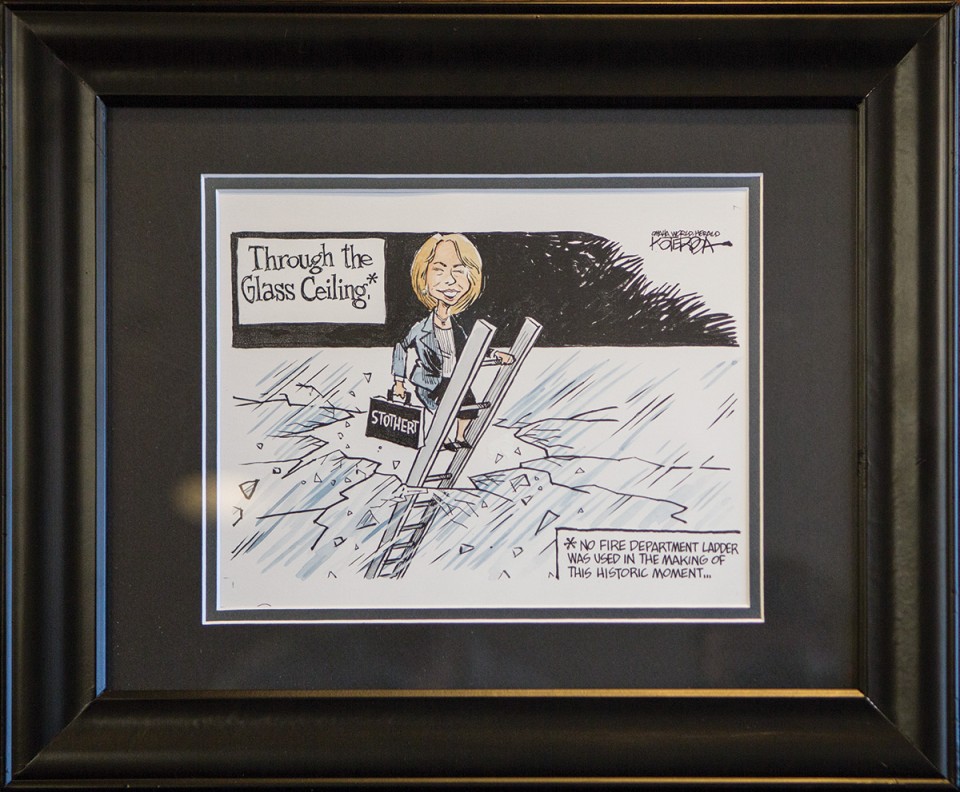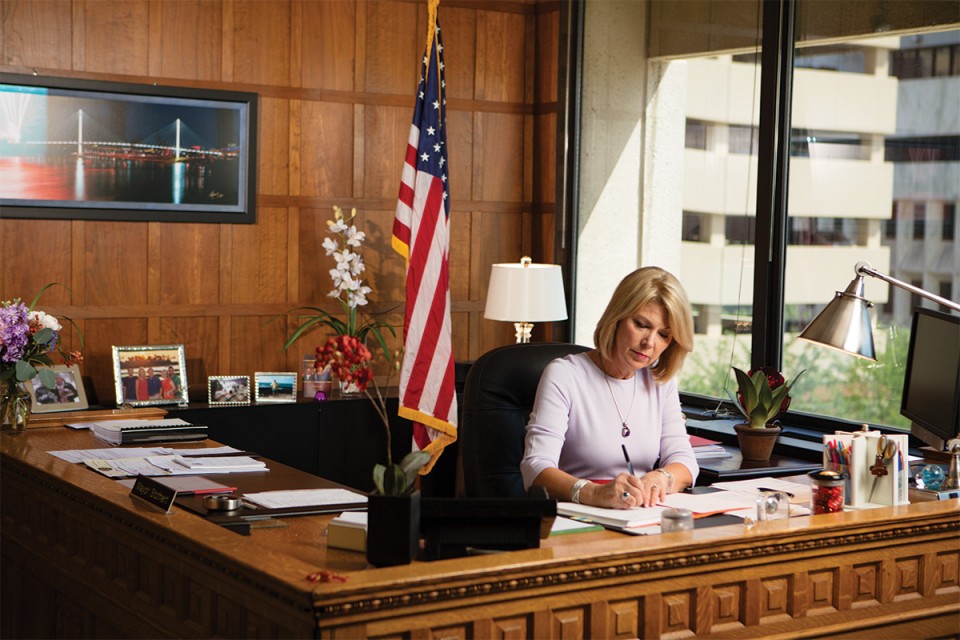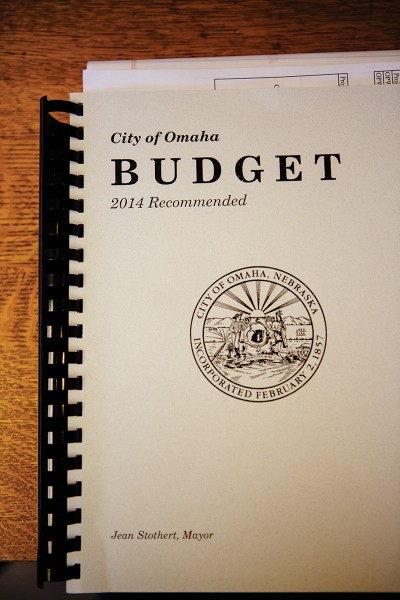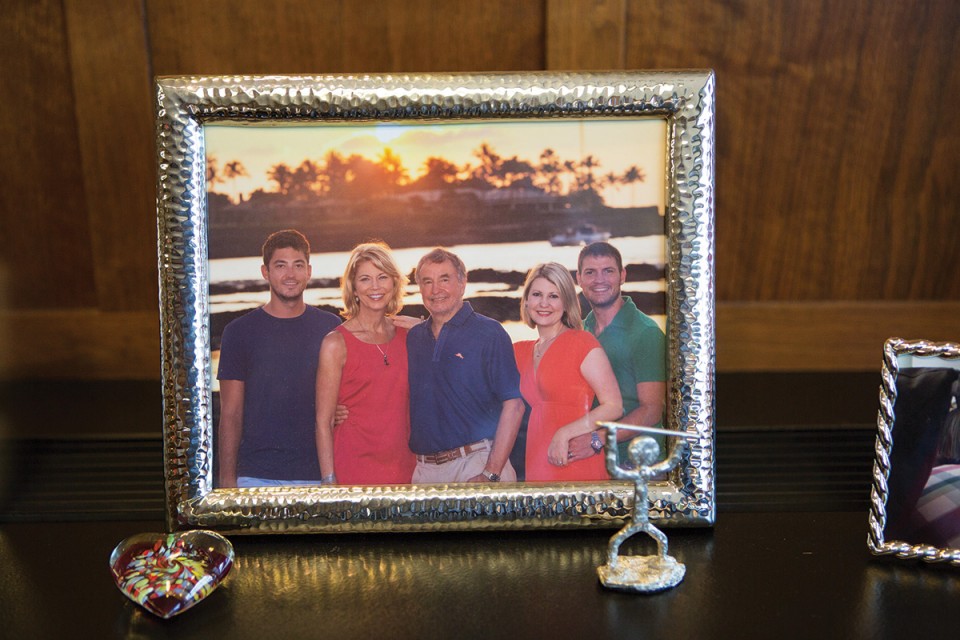The corridor leading to the Omaha mayor’s office serves as a gallery for a long line of portraits of the city’s past mayors. It is a wall-to-wall boy’s club.
This day, the portrait of the city’s newest mayor is off at a photography studio waiting to be framed. But once it arrives, it will be an image long overdue on this wall.
It’s the first picture of a woman in the hallway on the third floor of the Civic Center.
“It was not an issue in the campaign, and it was not something I thought about,” says Mayor Jean Stothert as she sits at the conference table in her new office. “But yes, there’s no question I’m proud to be the first female mayor of Omaha.r
“You get pretty sick of the ‘*-word.’” – Jean Stothert on women in politics
r“Some of my biggest influences are those strong, pioneering women who broke new ground. I love Margaret Thatcher. I would love if someone called me The Iron Lady.”
So be it. Jean Stothert—The Iron Lady. It’s a name both friend and foe are likely to find fitting.
Conservative, like Thatcher. Driven. A homemaker from humble beginnings turned successful political figure. A tough, sometimes polarizing figure. A woman who can shrug off, and move on from, the sometimes vile comments only female political figures have to face.
“You get pretty sick of the ‘c-word,’” she says. It isn’t unusual for women in politics to be pushed to prove their “toughness.” So where is the “Iron” in the “Lady?” In Stothert’s case, not only did politics help galvanize her; so, too, did her years as an ICU nurse.
Humble Roots
rStothert grew up in Wood River, Ill., outside St. Louis, “a refinery town where my dad worked at the refinery.”
He was not in a union, if you were wondering. Like Thatcher, Stothert—as she has proven already with the firefighter’s union—stands in vocal and firm opposition to some union interests.
The specs of her childhood home roll quickly off her tongue. “Tiny house—living room, kitchen, four kids, one bathroom,” Stothert shares. She’s clearly said this many times before. It is a counterpoint raised often in political spheres when people note that she lives with her surgeon husband in often-assumed-to-be-more-affluent-than-it-is Millard.
She walked to school, had a job, did volunteer work. She wanted to be a nurse “because it seemed like a good way to give back to the community.” While many of her friends chose to work in hospitals in more affluent parts of St. Louis, she chose to “be where I was most needed”—with the Trauma Center at St. Louis University Hospital in the heart of the city.
You have to become an Iron Lady to be a nurse in an inner-city trauma center.
“You see it all,” she says. “I’ve done CPR on hundreds of patients. I’ve opened people’s chests and done internal heart massage. I’ve wrapped up bodies and taken them to the morgue over and over again. That’s just how it is.
“I like the challenge of making a critically ill patient well. But sometimes, I’m not going to make that patient well. They’re going to die. The thing is, I never want to get that hard edge. You can do tough work without losing your humanity and compassion doing it.”
From Homemaker to Politician
rIt was in this environment that she met trauma surgeon Joe Stothert.
After five years of dating, they married. In time, the couple moved to Seattle with his job. Then to Galveston, Texas, where the couple’s daughter, Elizabeth, and son, Andrew, were born.
Then to Omaha, Neb., “in good part for the better schools,” Joe notes. With two young children and a husband with a job that took him away at all hours, Jean decided she would stay home with her children.r
“She has always been strong-willed but wonderful at listening to others and working together with people to get things done.” – Joe Stothert
rIn little time, being an at-home mom entailed diving into work with her local parent-teacher organization. Joe says it was a natural fit for her.
“She has always been strong-willed but wonderful at listening to others and working together with people to get things done,” he says. “Then, as an ICU nurse, she was working with an immense amount of sophisticated mechanisms. She enjoyed that. I think she was quickly interested in the mechanisms of government.”
Getting Out the Vote
rThree years after the family arrived in Millard, three positions opened on the Millard School Board.
“There were 13 people running. A full field,” Stothert says. “I didn’t have much money, so I figured we’d have to hit the streets and knock on as many doors as we could. We won by a good bit. We learned right then how important it is to get out and talk to everyone you can.”
That shoe-leather, door-to-door campaigning with her and her supportive family at its core has been the key to her continued success. She served two more terms on the Millard School Board before her election to the Omaha City Council, which, she says, was a logical step.
“School boards are very much like city councils,” Stothert says. “You manage multi-million-dollar budgets, you have labor negotiations. It wasn’t much of a leap at all.”
During her time on the school board, she suffered her only loss so far in politics: a 2006 bid for the state legislature against Democrat Steve Lathrop.
It was one of the closest races in state history. Initially, it appeared Stothert had won by only a few votes. She celebrated with a small vacation with her husband. When she returned, she found out that after absentee votes were counted, she had lost by 14 votes. Stothert said the final margin—after some votes were contested—was five votes.
“So maybe you should have picked up 10 of your friends and driven [them] to the polls,” she recalls having wondered to herself. “Yes, I thought about it. But I truly believe we did the best we could. I think I learned more in losing than I did in winning. I also truly believe that things happen for a reason.”
She then turned her eye toward the Omaha City Council. She asked Joe if she should run. “I said ‘no,’” he says. “She ran anyway.”
Taking on the Big Boys
rShe had no plans to run for mayor when she won her seat on the council, but, in time, she says, she “decided that we needed a change.”
In her race for mayor, her calls for smaller, more streamlined government resonated with voters. Her ground game grew considerably. At its core was a relentless door-to-door campaign by the entire Stothert family.
Joe took 10 vacation days prior to both the primary and the general election. Her son, who is pursuing an advanced degree at the University of South Florida, and her daughter, who works at Union Pacific, also joined in.
Stothert proudly showed off a framed photo of her and her husband in the middle of a residential street during one of the weekend campaign blitzes. The city was socked in by a blizzard that weekend. The Stotherts are wrapped in wet winterwear. Part of Jean’s hair is frozen and cocked sideways. Joe’s right thumb is protruding from a hole in his glove.
It’s a picture of resolve. They knocked on 15,000 doors. She says Joe helped push her on when she grew tired on the campaign trail. Joe insists, “She never would have gone on if she didn’t want to.” It’s also a picture, she jokes, of the Stotherts on a date. “We really have enjoyed those times together,” the mayor says.
The Ugly Side of Politics
rAt times, the war of words during the campaign got brutal. Stothert, often characterized as a hardline conservative, can throw fire as well as she receives it. But particularly in the modern world of blogs, tweets, and every sort of website, the personal stabs at those in the public arena are often relentless and outrageous.
Stothert admits that, during the campaign, she failed to heed advice that she avoid reading all the attacks on her on the internet. Also, some of the nastiest—and most sexist—of the insults blew up into campaign issues she then had to address.
She boldly repeats two comments about her—one, a joke essentially about her being gang raped, and another about her being a stripper—that one would not expect to hear verbatim in an interview with the mayor.r
“She would get pretty stern. She would challenge me, I would challenge her.” – State Senator Brad Ashford on Stothert
rBut there is often a flipside to such outlandish attacks. People get angry. In this election, Stothert admits, polls showed that a substantial number of women responded to the sexist attacks by moving into her camp.
Stothert says she’s not afraid of criticism. She invites it, as long as it’s civilized. But she knows now to avoid the constant barrage in cyberspace.
“It’s just not good for your mental health,” she says. “It wouldn’t be good for anyone’s health.” Her husband, as you might imagine, hasn’t handled some of the nastier or more personal criticisms with such a thick skin. “I don’t forgive and forget as easily,” Joe says. “She’s the one who can do that. Early on, she had it pegged. She told me the jabs were going to hurt me more than they would hurt her.”
Tackling Tough Issues
rThe criticism is not going to ebb. She will continue to grapple with the powerful and vocal firefighter’s union. While sitting at her office’s conference table, she points to her desk. The gritty specifics of her proposed budget to streamline government “are sitting right over there,” she says.
She promises to cut government and cut taxes while improving government services. There are few political figures who have not claimed they could accomplish this feat. There are few who have.“We are going to succeed,” she says. “I have no doubt about that.”
If anyone can pull off this trick, it might be Stothert. State Sen. Brad Ashford, who ran against Stothert for mayor while also working with her on several issues on the state government level, says Stothert, while always civilized, is a tough and driven negotiator.
“She would get pretty stern. She would challenge me, I would challenge her,” Ashford says. “There’s nothing wrong with that. In the end, that’s how you make good policy.” In Ashford’s mind, Stothert’s best chance to save money while improving services will come “if she’s committed to consolidating” many services that both the county and city provide.r
Finding Equilibrium
rTo keep a sense of balance, Stothert says, she knows she has to guard her personal time. She has a life outside the demands of the mayor’s office. “I love my home,” she says. “I’m pretty good at getting there, calming down, and shutting things off for a while.”
Her day is fairly regimented, as you might expect. She’s up at 5 a.m. After a usually healthy breakfast, she walks for 30 minutes on her treadmill, then takes her Australian Shepard, Ozzie (named after St. Louis Cardinals Hall of Fame shortstop Ozzie Smith), for a one-mile walk.
Back at home, she watches little television beyond the news. Instead, she relaxes by reading “a lot of fiction.” Her favorite books: one from her childhood, To Kill a Mockingbird, and comedian Tina Fey’s Bossypants (the cover of which inspired our magazine cover concept and, yes, the mayor enthusiastically “suited up” for the photo shoot).
If she has the time, she loves to get in the kitchen. “My friends and I used to get Bon Appétit magazine and try things all the time,” she says. “I would consider myself a gourmet cook now. I enjoy any time I can cook something myself.”r
“I’m pretty good at getting [home], calming down, and shutting things off for a while.” – Jean Stothert
rIf she can’t, she’s also a fan of numerous Omaha restaurants. One stands out though, she says, perhaps because she fell in love with the fresh fish dinners she ate during the family’s time living in Seattle.
“The Twisted Cork has wonderful halibut and salmon,” she says. “I just love the food of the Pacific Northwest when it is done well.”
Then it’s five hours or so of sleep, the morning exercise, and off to another day as The Iron Lady.
“I’m a very black-and-white person,” she says. “I’m a very determined person.”
Meaning?
“We will achieve better services for less money,” she says. “We are not reducing city service, and we are going to balance the budget. This is what the people of this city have asked me to do, so that is what we’re going to get done.”


